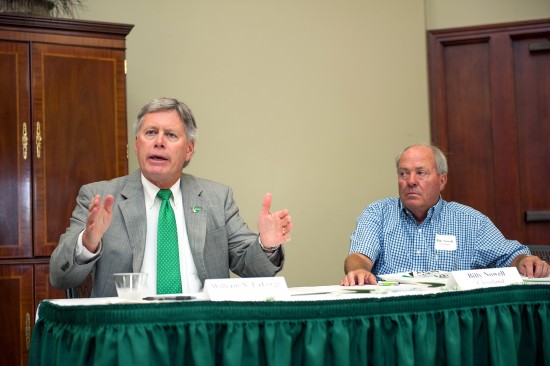 Delta State University President William N. LaForge (left) addresses mayors from across the Delta for the second annual Mayors' Summit on campus today.
Delta State University President William N. LaForge (left) addresses mayors from across the Delta for the second annual Mayors' Summit on campus today.Mayors from across the Mississippi Delta gathered at Delta State University today for the second annual Mayors’ Summit hosted at the Hugh Ellis Walker Alumni-Foundation House.
The university invited mayors from all of the municipalities in Bolivar, Coahoma, Leflore, Sunflower and Washington counties as a way to reach out to surrounding communities and engage local leaders in a discussion about university and community activities.
President William N. LaForge was excited to build on last year’s inaugural summit.
“I was encouraged by the dialogue that took place and the desire of our Delta area mayors to work together for the betterment of our region,” said LaForge. “I want to continue to grow these partnerships, and I am anxious to discover additional ways that Delta State can work to support local communities as they continue their support for the university.”
This year’s meeting focused on plans and topics for Delta State’s third annual race relations conference, Winning The Race, which will take place in the spring of 2016.
The mayors in attendance also appreciated the opportunity to voice their collective thoughts.
“It’s great anytime people come together to communicate about being in the same place dealing with the same things,” said Darryl Johnson, mayor of Mound Bayou. “When leadership comes together to talk about what we can change and what we can do to move forward on the same page, you can bet something good will come out of it. I applaud the efforts of President LaForge for what he’s doing to bring us together.”
Mayor John Cox of Greenville echoed praise for the university’s efforts.
“It’s important that you look at the big picture first, especially as we’re talking about race relations across America,” said Cox. “I think it’s a very good thing that a local university is putting this topic at the forefront. I think it will continue to pay dividends for the communities and campus.”
LaForge said the university takes pride in being a leading example.
“Delta State is committed to leading a dialogue about race relations in an effort to strengthen our communities,” said LaForge. “We want to hear your ideas and input on suggested topics and areas where we should focus our efforts to assist you and your communities with this important dialogue.”
One important piece of this dialogue was the potential for change in the Mississippi state flag, which flies large above Delta State’s main entrance to campus.
The university released an official statement today supporting a change to the “Stars and Bars” symbol that the flag boasts on its top left corner. Mississippi is home to the sole remaining U.S. state flag that depicts the Confederate battle flag symbol.
“Delta State University stands as a living testament to the successes of equality, fairness and social justice,” reads the statement. “We will continue to recognize and reflect on Mississippi’s history, but we will also continue to provide leadership throughout the state and beyond in advancing the understanding and appreciation for our differences and our common challenges in the region. For these reasons, Delta State University supports making a change to a symbol, such as Mississippi’s state flag, that promotes divisiveness and serves as a barrier to understanding.”
As Mississippi’s most racially diverse public university, Delta State proudly embraces the region, heritage and its people. Despite being located in an area characterized by some as a place of poverty and racial inequality — the Mississippi Delta — Delta State has successfully recruited students and faculty from diverse backgrounds. Delta State is leading conversations about race relations and building stronger communities — most notably through the award-winning race relations conference.
The institution is also home to Mississippi’s only collegiate swimming and diving program, and boasts state-of-the-art facilities. Yet Delta State is not allowed to host NCAA swimming and diving championships due to the design of Mississippi’s current flag.
The NCAA has advised that, “…the Confederate flag is a symbol of oppression to many of our players, fans and coaches. It also believes that holding NCAA pre-determined championship events in Mississippi is not in the [sic] keeping with the established criteria.”
In announcing the university’s position, LaForge said, “In many respects, Delta State University is a cultural mecca, and we celebrate this multicultural identity associated with our people, musical heritage, literature and the arts. Those who visit the university and the Delta, from around the country and abroad, deserve to know we are a welcoming community.”

